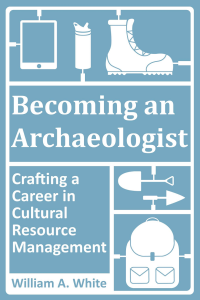 Yesterday, I participated in recording the latest episode of the CRM Archaeology Podcast—#120: Winter is Coming. Even though it’s a play off the Game of Thrones’ famous line, preparing for winter is a salient issue for any one working in cultural resource management industry.
Yesterday, I participated in recording the latest episode of the CRM Archaeology Podcast—#120: Winter is Coming. Even though it’s a play off the Game of Thrones’ famous line, preparing for winter is a salient issue for any one working in cultural resource management industry.
Winter preparations are different for CMRers at each stage of their career. In winter, company owners and principal investigators are probably trying to wrap things up for end-of-the-year accounting. They’re probably also doing something they hate the most—laying off some of their employees for the winter slow-down. Crew chiefs and project managers are probably finishing up reports, doing lab analysis, or preparing presentations for the spring’s conferences. Field techs tend to get laid off in winter, so they’ll be trying to find a way to pay their bills until the snow melts.
Students are caught in a unique position. Winter unemployment isn’t the big concern when compared with summer unemployment. As a non-traditional student, I used the comparative lack of employment during the winter as a chance to strategize for summer work. Here’s how I did it…
Staying employed
Whether you’re a grad or undergrad student, money is a perennial concern. This is not just an archaeology-related conundrum. It’s on the mind of every college student I’ve ever talked with.
Many university students—undergraduate and graduate—are unemployed over the winter. This is something they expect to happen. While being unemployed during the winter is normal for these folk, others expect a short break for Christmas and will return to their non-archaeology related jobs. Undergrads will stay in these campus jobs or grab another temporary job if they return home for summer. Work-a-day graduate students are more interested in trying to figure out how they can find a summer job that contributes to their studies. Grad students in archaeology are probably planning on doing some research and are hoping to get paid to do it.
Many archaeo undergrads don’t seriously consider finding work in CRM during the summer because they know the odds are stacked against them. Undergrads don’t yet have a BA, which is advertised as a requirement for being a field tech. They also don’t have as much experience as other CRM applicants, an increasing number of whom have a graduate degree. While it is more difficult to find a tech position without a BA, I recommend all undergrads spend time connecting with CRM companies near their homeland AND in the vicinity of their university so they can draw upon the connections built up over the year to talk their way into a summer field tech position (see the “Networking” tab on this website to learn more about talking your way into a job).
Since I’ve spent 7 years of my adult life as a graduate student and 4.5 more as an undergraduate, I will share my rubric for surviving those periods of unemployment that come along with being a college student in the United States. In the U.S., college students don’t get a stipend. We don’t all get “funding,” however that’s defined. The vast majority of us have to hustle for our food. Here’s how I did it:
August—November: For college students, preparations for summer actually begin in the fall because this is when the majority of graduate scholarships, fellowships, and grants have application deadlines. Since I’ve spent way too many weekends slamming out grant applications, I recommend you write your applications in short, focused sessions—half an hour to two hours—that take place at a scheduled time each week. (Don’t know how to successfully write for grants? Here’s a basic template I used to get started as a PhD student. Using this template along with consistent action is how I funded my PhD [https://theprofessorisin.com/2011/07/05/dr-karens-foolproof-grant-template/]).
As a PhD student, I spent about an hour each Saturday morning finding funding opportunities on the university’s grant clearinghouse. I used an Excel file to organize and schedule each grant deadline, making sure to write down which ones needed letters and who would write those (NOTE: I know your adviser will write a lot of letters for you but don’t beat up your whole department for letters of recommendation. This will exhaust them as they have to write for all of their own students. You’ll get a sh*tty, generic letter if they get sick of writing for you.) Make sure your list includes departmental, university-wide, and other sources of grant funding.
Once I’d exhausted making the list for the entire scholastic year, I’d start writing for each opportunity based on the requirements. Writing for university grants is easy if you’re applying for funding for the same or similar projects because you can use existing applications as boilerplate for subsequent ones. It also makes it easier for faculty to write rec. letters because they’ll be more familiar with your projects. Here are some tips for landing scholarships to fund your education (https://www.iwillteachyoutoberich.com/blog/how-to-get-scholarships/).
December—April: This is the winter for which you’re trying to prepare. Here’s where you try to land: 1) paid work related to your research (i.e. lab work, teaching over the winter session, or something like that). It’s cool if you’ve landed a fellowship or scholarship that will pay you over the academic year. If you’ve got funding, either try to build upon what you’ve already got or focus on getting your research published.
The winter is also a time when you should be heavily networking in preparations for summer. This is when you’re going to conferences. You should be thinking about the upcoming conferences you’re going to attend: writing your presentation, getting your slideshow created, and practicing your presentation until you can give it without reading it from a paper script. This is when you should be chatting up faculty in hopes that you will get hired to work for someone that has money. Or, this could be when you’re getting advice and feedback on summer projects funded by your grant writing efforts. These efforts should focus on ironing out any potential problems with your summer work.
January—May: This is when you should be trying to get a job. Get your CV or Resume ready. Start doing online research for companies near your university and near your home town. Start sending emails through your network in hopes of getting a lead on summer work. Find the phone numbers of key contacts and start calling. If you don’t have funding for the summer, spring is the time to act.
NOTE: This time table is different for those trying to get teaching jobs. For academia, the application period for tenure track and post-doc positions is primarily in the fall. There will be very few of this kind of positions offered in the spring. However, you should know how you did this year’s round of academia applications by spring. You’d know if you were going to get a campus visit or an interview by this time. If you haven’t landed an interview, spring is your time to find a job in CRM.
May—August: This will be the starving time for some, but will be perfectly fine for those who planned accordingly. Summer is when a lot of archaeology happens. If you’ve planned your year properly, you won’t’ have anything to worry about. If things didn’t work out for you this summer, think about how you can change your situation through a lot of scholarship/grant writing, networking, or applying to jobs. There’s always next year.
What can you do today to keep from starving?
There is no better time to look for a new job than when you already have one. The Succinct Research Blog is loaded with job search strategies that can help you in your quest to stave of summer starvation. In addition to spending some quality time on this blog, here are some other things archaeology students can do to further their job search:
- Start that Excel file of grant/scholarship possibilities
- Start writing for funding.
- Look for professors/scholars with money that you can partner with.
- Never stop publishing your work.
- Talk to those who have achieved what you’d like to accomplish. How did they do it? Is this something that can be replicated? How can you adapt their success story to your own life situation?
Right now, turn on your computer or open the notepad on your phone. Write down the easiest, smallest step you can do to find work for the summer. Don’t delay. Start right now. Do something to keep you out of the unemployment line next summer.
Got a question? Write a comment below or send me an email.
 Having trouble finding work in cultural resource management archaeology? Still blindly mailing out resumes and waiting for a response? Has your archaeology career plateaued and you don’t know what to do about it? Download a copy of the new book “Becoming an Archaeologist: Crafting a Career in Cultural Resource Management” Click here to learn more.
Having trouble finding work in cultural resource management archaeology? Still blindly mailing out resumes and waiting for a response? Has your archaeology career plateaued and you don’t know what to do about it? Download a copy of the new book “Becoming an Archaeologist: Crafting a Career in Cultural Resource Management” Click here to learn more.
Check out Succinct Research’s contribution to Blogging Archaeology. Full of amazing information about how blogging is revolutionizing archaeology publishing. For a limited time you can GRAB A COPY FOR FREE!!!! Click Here
 “Resume-Writing for Archaeologists” is now available on Amazon.com. Click Here and get detailed instructions on how you can land a job in CRM archaeology today!
“Resume-Writing for Archaeologists” is now available on Amazon.com. Click Here and get detailed instructions on how you can land a job in CRM archaeology today!
 Small Archaeology Project Management is now on the Kindle Store. Over 300 copies were sold in the first month! Click Here and see what the buzz is all about.
Small Archaeology Project Management is now on the Kindle Store. Over 300 copies were sold in the first month! Click Here and see what the buzz is all about.
Join the Succinct Research email list and receive additional information on the CRM and heritage conservation field.
Get killer information about the CRM archaeology industry and historic preservation.



